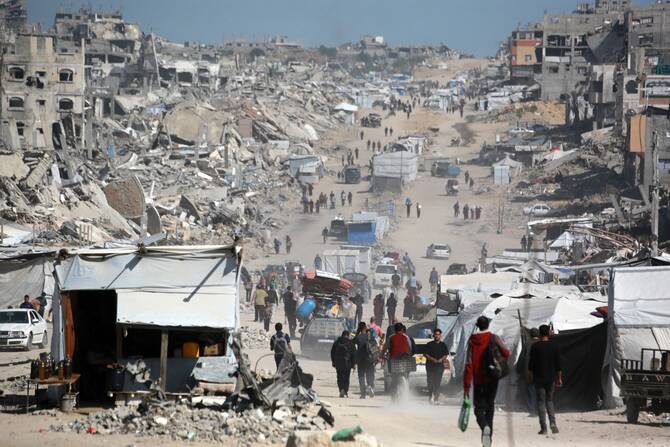For Israelis, acknowledging the Nakba is a necessary step to peace

https://arab.news/6y5mb
Nations tend to be hesitant, mostly scared, to confront dark periods in their histories. One such dark period in the history of Israel is the war of 1948, which to it is a war of independence but to Palestinians it is the Nakba, or “Catastrophe,” the 77th anniversary of which they commemorated last week.
It can hardly be disputed that this war led to the mass displacement and dispossession of Palestinians: more than 700,000 of them became refugees in neighboring countries; there were many casualties on both sides; many Palestinian communities were destroyed; and Israel expanded its territory far beyond what UN Resolution 181, better known as the Partition Plan, allocated to it in 1947.
Why is it, then, that Israel will not acknowledge its part in causing the Nakba?
There is no single answer to this question, and the ones we have range from the psychological to the practical. Neither type of response from Israel can ever be satisfying, as they all deny justice and make a reconciliation of the two peoples impossible.
For the victims of the Nakba, the denial of their victimhood adds insult to injury. Psychologically, for Israelis to accept and internalize the fact that their soldiers were capable of inflicting unbearable pain on others, some of which was planned and not merely an aberration on the part of individuals, is almost unbearable in itself.
It is an even greater challenge for a people who, for centuries, suffered tremendous persecution themselves to accept that they, too, are capable of committing atrocities against others.
In practical terms, acknowledgment of even some responsibility for the Nakba is something that terrifies Israelis because it might imply an obligation of restitution, and especially of recognizing the universal right of return for Palestinian refugees to the places in which they resided before the war.
There might be a grain of truth to this but what is particularly shocking, especially considering Jewish history, is that so many Israelis are incapable of understanding the power of simply saying “sorry,” or of showing empathy so as to open the door to forgiveness.
A second Nakba is unfolding before our eyes, proving we have learned very little from the long history of this conflict.
Yossi Mekelberg
Moreover, in the minds of most Israelis, admission of any responsibility for the Nakba would equate to acceptance that their country was born in sin, and leave open the question of Israel’s right to exist. There are certainly those who adopt this existential argument against Israel but they hardly represent the majority.
Israel was established based on a UN resolution, which provides it with international legitimacy, and those who question its right to exist undermine the other aspect of the Partition Plan, an independent Palestinian state, and therefore only prolong the conflict and, with it, the bloodshed.
In the same vein, when Israel refuses to consider, or at least obstructs, the path to a two-state solution, it undermines its own legitimacy and only prolongs the consequences of the wrongdoings committed during the Nakba.
Recognition of the suffering of Palestinians is about acknowledging awareness of the fact that there was suffering on both sides, and that by taking responsibility and expressing genuine sorrow the path to reconciliation is made easier.
Instead, despite the wealth of available documentation on the events of the Nakba, written, oral and photographic, Israel adheres to a narrative of its war of independence that exonerates it of any wrongdoing.
Until the 1980s, there was complete denial, even within Israeli academia, that Israel committed atrocities during the war of 1948. These actions included the expulsion of entire communities, in which 15,000 people lost their lives, and the uprooting of two-thirds of the Palestinian population from their homes and their relocation to neighboring countries, in addition to other forms of human rights abuses employed as ways of instilling fear into Palestinians to encourage them to leave.
By now, there is enough reliable evidence from official Israeli sources, including army archives and accounts from soldiers who participated in the war, of the official plans to drive Palestinians from their homes and out of the country.
Israel’s first prime minister, David Ben-Gurion, and the military establishment had two objectives in mind: to expand the new country’s territory beyond what was allocated to it under the Partition Plan and to change the demographic balance between Jews and Palestinians in the territory Israel would end up controlling.
For the nascent Israeli state, both these objectives were accomplished. It extended its sovereignty from the 55 percent of Mandatory Palestine allocated under the Partition Plan to 78 percent by the end of the 1948 war, with more than 700,000 being expelled. But this came at a horrendous price to many ordinary Palestinians as a result of the Nakba.
If Israelis were to realize and internalize their fundamental part in the suffering of Palestinians, they would be taking an important step toward finding a just solution to the conflict and a reconciliation between their peoples.
This would also entail recognition of the fact that the suffering of those who were dispossessed did not end 77 years ago, but has endured as an ongoing condition of statelessness; many still live in refugee camps, suffering from discrimination and, on more than one occasion, have been caught up in the internal strife of host countries.
The 1948 Palestinian refugees have grown to a population 5.9 million, comprising the surviving original refugees but mostly their descendants, who are registered with UNRWA, let alone those living under Israeli occupation — and in the case of those in Gaza, currently enduring a living hell.
Israelis might fear that acceptance even of partial responsibility for the Nakba would back them into a corner. On the other hand, they might find that it creates goodwill among most Palestinians. For too long, Israel has not only deprived Palestinians of their rights but of their history too. It has banned the rebuilding of devastated communities, it has changed place names from their original Arabic to Hebrew and it will not have an honest conversation about what happened in 1948.
Not everything can be rectified with the passage of time. And in the midst of the worst war between Israelis and Palestinians since 1948, recognition of the Nakba as part of a healing process seems a very remote possibility, given that so many fresh wounds, including the expulsion of Palestinians from Gaza, are raw.
But this just makes the need to talk about the 1948 Nakba even more important, because a second Nakba is unfolding before our eyes, proving we have learned very little from the long history of this conflict.
- Yossi Mekelberg is a professor of international relations and an associate fellow of the MENA Program at Chatham House. X: @YMekelberg









































